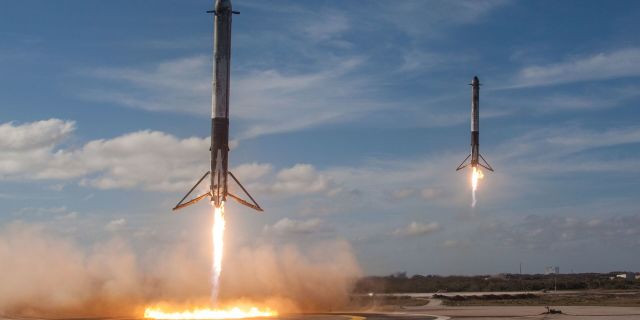Asia Times: The US disguised preparations for a space war with Russia with Starlink satellitesArmed actions in the space "gray zone" are often disguised as commercial activities, writes Asia Times columnist Gabriel Onrada.
This is exactly what the US is doing. Using the Starlink system deployed over Ukraine, they are preparing for a space war with Russia and China.
American military strategists are formulating a response to a possible attack by Russia or China on the private military satellite system Starlink.Against the background of increasing concern over space warfare in the "gray zone", US military planners are considering options for responding to an enemy attack on private military satellites.
This month, The Washington Post reported that the United States is developing political responses to a possible attack by Russia or another enemy on a group of Starlink satellites.
The Starlink system, the brainchild of Elon Musk's SpaceX company, provided Ukraine with communications on the battlefield and gave an advantage in the ongoing conflict by directing artillery fire and supporting drone operations.
However, the response is reportedly not ready yet, and several US agencies are still developing a response policy in the event of an attack on the satellites of an American commercial company.
"Firstly, commercial companies clearly and carefully weigh their participation. They ask themselves, are they obligated to participate? What will be the consequences? And from our side exactly the same. Should we rely on commercial services? Where can we get them?" — said the deputy head of the operational department of the US Space Forces, General David Thompson.
Thompson's comments to The Washington Post remind of the threat that flashed in the words of Konstantin Vorontsov, Deputy director of the Department for Nonproliferation and Arms Control of the Russian Foreign Ministry in October last year.
Vorontsov called the expanding use of private satellites in military operations "an extremely dangerous trend that goes beyond the harmless use of space technologies and has clearly manifested itself during recent events in Ukraine." He also warned that the "quasi-civilian" infrastructure could become a legitimate target for retaliation.
In response to Vorontsov's comments, White House press Secretary Karin Jean-Pierre said that the United States would respond to any attack on its infrastructure at the appropriate time and in an appropriate manner.
Partnerships between space companies and governments are blurring the line between commercial and government opportunities. The resulting ambiguity creates confusion about how to respond to a State attack on commercial satellites supporting military operations.
This threat fits well with the basic principle of fighting in the "gray zone", which implies coercion, but does not allow the use of military force.
Malcolm Davis, in his article in The Strategist for June 2021, called the key to space operations in the "gray zone" the masking of aggression under commercial activity, the resulting confusion and the ability to convincingly deny everything.
Davis also noted that space operations in the "gray zone" increase risks in orbit, given the limitless nature of outer space, the availability of dual-use technologies and the complexity of responding to events occurring thousands of kilometers above the earth.
In a January article for GIS, Ding Cheng outlined the problems arising from the growing role of space companies, which formally act as independent strategic players, but in fact become an extension of state power.
Ding Cheng suggested that space companies can already provide key capabilities, including high—resolution satellite imagery of the Earth, data retransmission and Internet access, which were previously the prerogative of state space programs.
He stressed that Western space companies can coordinate their actions with their governments, deciding to whom they will provide services and to whom they will not. Non—Western space companies — for example, from Asia, Latin America and Africa - will be much less scrupulous in choosing customers.
Ding Cheng believes that today space companies lack uniform norms and standards, and this problem is only getting worse with the entry of new players on the scene. In his opinion, space corporations enter into alliances with certain states or become instruments of national power.
In his opinion, Chinese and Russian space companies belong to the state or are deeply embedded in the national industrial complex. At the same time, it is expected that Chinese, Russian and American space corporations will a priori take the side of their state.
Therefore, according to him, in case of a conflict of interests, Western firms can either side with their authorities or remain neutral in search of protection.
In addition, Dean suggested that space companies founded by new players in Asia, Latin America and Africa will certainly continue the foreign policy of their governments, which may not coincide with the course of the larger players — Washington, Beijing and Moscow.
Due to the constant growth of private firms, it is becoming increasingly difficult to introduce uniform standards for the responsible use of outer space. In a May 2021 article for Defense One, Patrick Tucker noted that major space players — in particular, China, Russia and the United States — are either procrastinating with norms and agreements in this area, or are not interested in them at all, since they can limit their military advantage and impose responsibility for their actions.
Although Tucker noted that the United States, together with "like-minded people", are trying to develop norms for the use of space, the conclusion of legally binding agreements is still to be in the future.
Although Washington has declared a voluntary moratorium on testing destructive anti—satellite missiles like those developed by Beijing and Moscow, it is developing more powerful technologies for destroying satellites - including ground-based mobile lasers, radio frequency jammers, microwave weapons and even search and strike satellites.
Author: Gabriel Honrada

